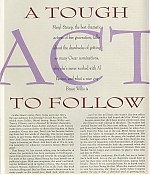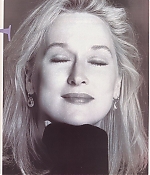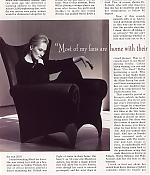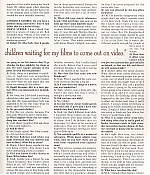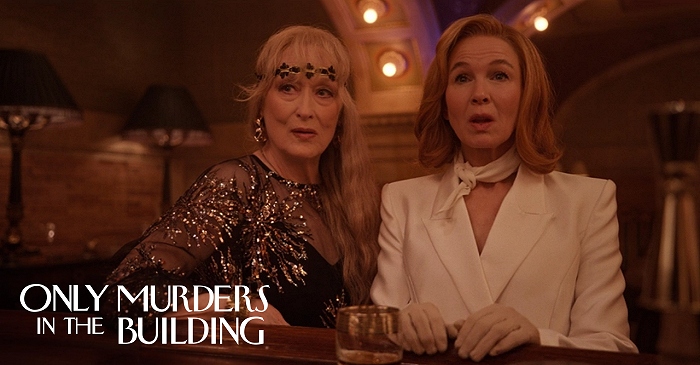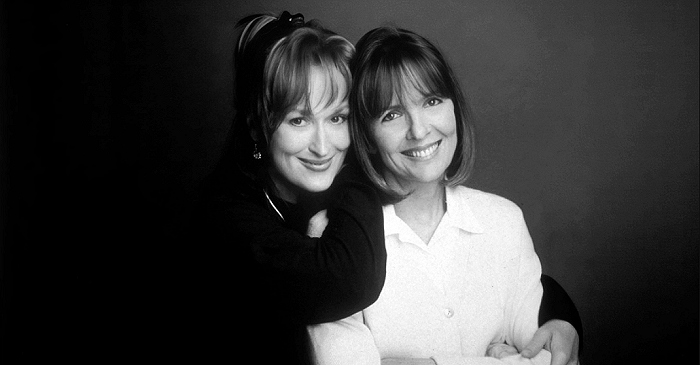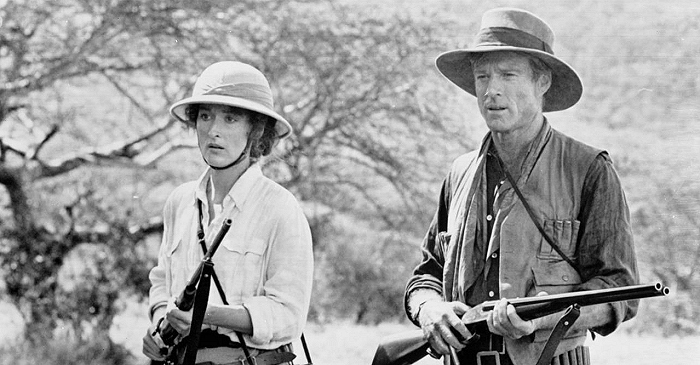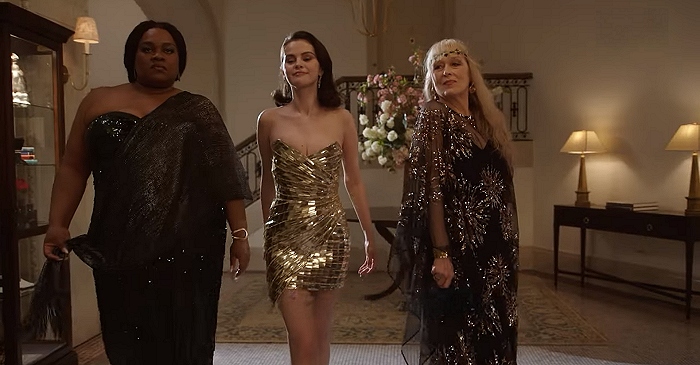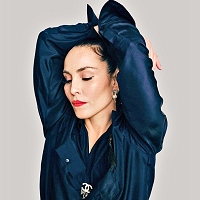|
Simply Streep is your premiere online resource on Meryl Streep's work on film, television and in the theatre - a career that has won her acclaim to be one of the world's greatest living actresses. Created in 1999, Simply Streep has built an extensive collection over the past 25 years to discover Miss Streep's body of work through thousands of photographs, articles and video clips. Enjoy your stay and check back soon.
|
|
A Tough Act to Follow
Movieline ·
August 1992
· Written by Lawrence Grobel
| ||
|
Tags
|
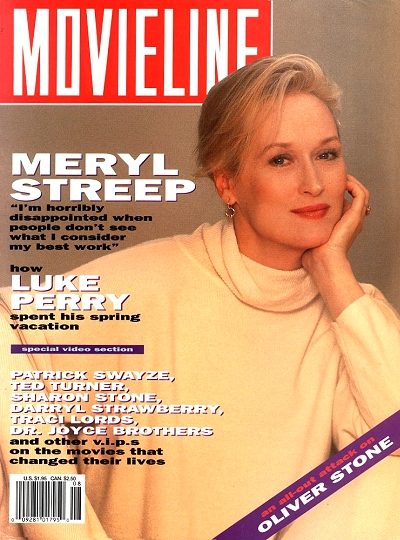
Goldie Hawn’s sister, Patti, looks worn out. She’s the unit publicist for Universal’s “Death Becomes Her”, which stars Goldie, Meryl Streep, Bruce Willis and Tracey Ullman, and is directed by Robert Zemeckis, whose “Who Framed Roger Rabbit” and “Back to the Futures” make him a curious choice to direct this blackest of black comedies. Given this cast, Patti’s job has become harrowing these last few weeks of shooting. One movie magazine want to put Streep, Hawn and Willis on their cover. The New York Times wants to hang around the set for a piece. Vogue is focusing on Meryl. And here I am at 10 a.m. waiting patiently for whatever moments Queen Meryl will grant. That Streep, 43, has started talking may be indicative of where the pendulum has been swinging in Hollywood – away from actresses over 40 towards the younger ladies. For most of her career, Meryl Streep has kept herself out of publicity’s glare. With rare exceptions, she wasn’t out hawking her brilliant work in “Sophie’s Choice”, “The French Lieutenant’s Woman”, “Silkwood” or “A Cry in the Dark”. Her work was her calling card. But her films weren’t always seen by as many people as she would have liked. And, while she was paid in the millions, she wasn’t the box-office attraction studios bad hoped she’d be. Slowly, she became aware that she’d have to give a little more, that she’d have to start talking to the press. The studios had pushed Pacino and De Niro into talking. Even Streisand and Beatty had begun pushing their product. So when “Postcards from the Edge” was in the can, Meryl Streep demonstrated her talent to strangers of another profession. She flashed her radiant smile at the press, she laughed, she was friendly. And again, when “She-Devil” was done, there she was on the cover of magazines with Roseanne Barr, of all people. Gone was the otherworldly look she assumed when she graced covers as “The French Lieutenant’s Woman”. Here was Mother Meryl, happy and confident.. So glad to mett John and Jane Q. Public.
Still, there were conditions. She’d talk, but not at home. She’d hold forth on the set. Reporters would have to wait for their time with her, between takes, during lunch breaks. There’d be no extended time for in-depth explorations. Let Sean Young do that. When she wanted a forum to vent her concerns, she chose to testify before Congress against the use of Alar, a chemical used in growing fruit which was eventually banned. And two years ago she delivered a scathing adress to the Screen Actors Guild prophesying that, with the way movies were going, women would be eliminated altogether by the year 2010. I stood watching Meryl for hours. She was sitting very still on a hospital gurney as Sydney Pollack, her “Out of Africa” director, played a doctor examining her. Pollack was in just for a day, and it was his scene. Prior to this moment, Bruce Willis, playing a wimpy plastic surgeon who leaves his girlfriend (Goldie) to marry her friend (Streep), has pushed Meryl down a flight of stairs in their home. But Meryl, a 52-year-old Madeline Ashton, has drunk a magic potion that will allow her to live forever, even though her neck is twisted grotesquely and her wrist flaps in every direction and she should be dead. This, of course, shocks Dr. Pollack, who will also discover that she has no heatbeat and that her temperature is below 80 degrees. Now, if this sounds parently silly, it is. And to watch grownups playacting this way can be fun at first. But not take after take. I mean, they’re all taking it so seriously! Yet one can’t help wondering whether it just may turn out to be a crowd-pleaser. That is, if crowds want to see Meryl playing bitchy, Goldie wearing a fat suit and Bruce “Die Hard” Willis portraying a nerd. Who knows, it just might make more money than all nine of the films Streep has gathered Oscar nominations for. But it’s very doubtful that she’ll be remembered for “Death Becomes Her”.
This comedy period of Streep’s – which includes “Postcards from the Edge”, “She-Devil” and last year’s “Defending Your Life” – might be somewhat analogous to Marlon Brando’s films in the ’60s. Some were interesting because Brando is always an interesting actor. But there was also a sense of sorrow about them because you knew what he had done in the ’50s. And you wanted that back. And just as Brando later returned with a vengeance with “The Godfather” and “Last Tango in Paris”, so undoubtedly will Meryl Streep come back to the powerhouse acting that made directors as diverse as Pollack, Hector Babenco and Mike Nichols dib her the best in the business. I tried to find out about her switch from heavy dramas to lighter comedies when we finally got togehter in her trailer during lunch break. We talked again when shooting was over over for the day and she had to sit in the makeup chair to have the latex around her neck carefully removed.
Lawrence Grobel: Do you have a problem doing interviews? You’ve said before they’re a waste of time.
I don’t think that they’re a waste of time at all. Bob Zemeckis said, “Meryl, if you want to be in movies, you have to be your own marketing person.”
Robert De Niro feels that if people are going to see his movies they’ll go whether he does publicity for them or not. He isn’t happy talking to the press. Do you feel his pressure?
Yeah, there is a pressure to publicize it. And you can sympathize because there’s just so much product out now – how do you make this one stand out among all the others?
“Death Becomes Her” is a zany picture. Were you interested in it immediately?
Yes, I was, but I did think I was being offered the other part. (Laughs) I had no idea that the song-and-dance lady was supposed to be me. But I like what it’s about and I like the humor of it.
Do you watch dailies?
Yes. But not always, because I’ve been sick. What I’ve seen I really like.
What happens when you see something that you don’t like?
I tell them! (Laughs) And ask them if they could reshoot it.
And do they?
No (laughs again). But I don’t usually – I’m not critical.
Hector Babenco said when you made Ironweed that you showed him how to direct. What did he mean?
Mmm. I don’t know, maybe he was just being cryptic. You mean I was there yammering at him in rushes?
Did you know Goldie Hawn or Bruce Willis before this?
Yeah, Goldie was a friend. So was Tracey (Ullman). But I didn’t know Bruce at all. All I knew was what I read – and what I read was completely untrue. He just came to this thing with much energy and willingness and lots of ideas, good-natured. Except for maybe Zemeckis and Scorcese, he’s also seen more movies than anybody I’ver ever met. He has a lot of references.
When did your movie references begin? Did anything you saw at an early age leave some indelible mark?
I remember the moment when I got it about Shakespeare and great literature. It was through Marlon Brando and audiovisual aids in high school. I was a sophomore and they showed us Julius Caesar. That whole production with James Mason, Guilgud, as unbelievable, fantastic. And I really heard the words. Before that I never paid attention because it was all so boring out of the mouth of the teacher
Was that the first time you saw Brando act?
Yeah. Then I searched his work out. I saw “Streetcar” and was a big fan.
Is it true that your image of a movie star was Sandra Dee?
Yeah, when I was a little girl. She wasn’t my idol, but that’s what I though a movie star was.
Did you have any idols?
No, I didn’t.
In your Screen Actors Guild speech you said that if girls don’t have role models they don’t have dreams.
Yeah, but that’s different from idols. I watched those ladies on the four o’clock movies with keen interest. All of them. And I do believe that it’s important for there to be women of substance that are in that kind of hyperbolic fictional setting for little girls to look up.
You certainly qualify as a woman of substance. While many admire your work, how do you feel? Have any of your films surpassed your expectations?
They always surpass my expectations. There’s such a time lapse from when I finish shooting and when I eventually see the movie – it’s like not seeing somebody who you’ve been very close to for a long time, and then seeing them again. Immediately you’re intimate with them, but something is different in the immutable distance and time that it’s somehow changes. So that I’m never prepared for the movie I see.
Are you affected by the box-office mentality?
Oh, I’m horribly disappointed when people don’t see what I consider some of my best work. Yeah, I’m very sad. But I know that I have a video life. Most of my fans are home with their children waiting for my films to come out on video. But I’m disappointed because certain things should be seen on the big screen. I was very proud of “A Cry in the Dark”, but it wasn’t distributed widely enough for people to have seen it on the big screen.
How does it affect your career when you put out a picture that gets critically acclaimed, as that one did, and doesn’t do well commercially?
It doesn’t affect my career choices. What affects your career choices are the three interesting scripts you get in a year, two of which you’re wrong for, one you think you might want to do if you’re real lucky. You can’t possibly plot what’s going to be available, what’s going to be written, who’s going to think of it, and if it will come to you or not. So thinking about what happened to the last film is not going to affect my choice next time, it really doesn’t. I always think everything is going to be wildly successful no matter what. (Laughs) I didn’t think “Ironweed” was going to break any box offices, but I knew it would have life.
Why is it actors never seen satisfied about doing what they’re really good at? Barbra Streisand excels in light comedies, but prefers heavier drama; Al Pacino’s strength is drama, but he wants to do comedy…
He’s right. He’s very, very funny. “American Buffalo” was the perfect thing for him, that beldn. He should do that as a film, he was so great. I saw him and Duvall do that – it was one of the best things I’ve ever seen. Ever. He’s funny even in his most serious roles. He’s always putting a twist on something. Look at “Dog Day Afternoon”. Fantastic. That’s an actor’s dream, to find something where you get laughs and it’s excruciatingly moving at the same time.
What have you done like that?
Well, I thought that “Sophie’s Choice” was kind of funny. Yeah, I did, in the lighter part of it. I’ve always liked to put a spin on a tragic thing, or find the pathos in a comedy. “Postcards from the Edge” was the closest I came to finding a nice blend.
What happened with “Man Trouble”? Didn’t you and producer Bruce Gilbert got to see Pacino about doing it?
Yes. Al just didn’t want to do it.
Was it because he didn’t think it was the man’s picture?
(Laughs giddily) Oh God, wouldn’t that be depressing if that was the reason?
Isn’t that sometimes what happens?
I don’t think that was the reaon. Because the part is pretty great. It’s pretty equal. The woman has more problems but the man is the fleshier character. Very funny character. Perfect for him.
Laurence Oliver once said: “Acting is a masochistic form of exhibitionism. It is not quite the occupation of an adult.”
I think that is something that men feel more than women. Because women don’t have as much a problem revealing their emotions, which is what it is about most profoundly. (Pauses) That exhausted me, that answer. (Chuckles) But I think it is masochistic. Sometimes I look grinder for the sixteenth take in an emotional scene, and it’s a precarious land you inhabit where everything is real for you and yet if you peel back the scales from your eyes you’d see people smoking and yawning and asking when is lunch. And you have to create the emotional moment. And it is very masochistic. But it’s very satisfying at the same time, because you experience some major thing during the day that a lot of people who are looking at their watches or yawning don’t. And that’s great to flex your emotional muscle. It’s a catharsis.
I was watching you between takes this afternoon, how you sat perfectly still on the gurney for four hours.
I tried to keep my back straight, did you notice?
It was more impressive than the work.
Stamina, that’s the other thing. That’s Oliver, too. He said that stamina is the major component in acting.
Have you ever been in the middle of something where you realized it’s a mistake?
Yes
But you wouldn’t want to mention what?
(Laughs) Absolutely not!
More than once?
Yes. More than twice!
I must admit it’s a bit disconcerting talking to you with that bulge on your neck. Every time you laugh I think your head might fall off. Is this the most extensive makeup you’ve had to endure?
Never so much and not every day, but I had a bigger makeup for “Out Of Africa”, when I had to play an old woman with pouches and eye bags. That took about four hours.
Did you like the way you looked as an old lady?
I looked like my dad, which was sort of a shock. Because I always thought that I would look like my grandmother.
Was your father Jewish and your mother a Quaker?
(Laughs) No. Streep was a name taken by Jews in Holland in the fifteenth century. Then they came to this country and became all sorts of people. Some of them in Holland became Catholics, some of them stayed Jews, some became Protestants over the centuries. He was raised Episcopalian or Protestant when he was a child. My mother’s father’s family were Quakers. My mother’s family were Swiss / English. Wolf was her maiden name. Mother’s name was McFadden, Irish.
Did you have a religious upbringing?
Well, I went to Sunday School but I was thrown out for misbehaving. I was 12.
Was it for making faces? Peter Lorre once said, ” I don’t act, I just make faces.”
Well, may be true.
But not with you? v
I don’t think it’s true with him either, frankly. But sometimes people say thing to deflect attention from what they’re really doing, because what they’re really doing is kind of embarrassing when you think about it. You wouldn’t want people to think you’re really feeling these things. And for men that is a problem. And then you’ve got men who are proud of their gushing.
I’ve always felt that actors of Brando’s era feld acting was somewhat emasculating, whereas the next generation of actors, like De Niro, Pacino, Hoffman, didn’t feel that way.
I agree, but it’s precisely because the people you mention have conciousley moved from characters that are either strong or fiercely masculine to other some more softer kinds of roles. It’s because they’ve kept their feet in both places that they can maintain. I think they played only strong men, there’s something faintly ridiculous about people who do just that. But those guys – you just never know what they’re going to be doing. It just always amazes me.
Are there lots of actors like that?
There’s lots of people. But you bring up the names because I don’t want to pick out anybody and leave out anybody else.
Does De Niro have genius?
Yes, sure. If that means that it’s something that’s visited upon him, like he’s touched by an ability to do something at once of himself and larger than himself, yeah, I would say that’s so.
Are there any actors you haven’t worked with yet who you would like to?
Yes, there are lots of good actors I haven’t been acted with. But I don’t want to say because then it becomes, “She didn’t say me.” That makes me uncomfortable. Duvall. Duvall. I would give anything to work with him.
You’ve worked with three major actors: Nicholson, Hoffman, De Niro. Do they act similarly or are they each very different?
Nicholson, who and De Niro? [Laughs] Hoffman!
Hoffman said during Kramer vs. Kramer that he wanted to kill you.
He didn’t mean that. He meant it in one scene – he was mad because I wasn’t mad. I forget what it was about. In the end he agreed with me. But with him everything is a competition, that’s what gets his juices going: who’s winning. And in that piece, that was appropriate. But actors like the ones you name – they all work very differently, just as directors all work differently. My mother said, after I made “The Deer Hunter”, “What was it like to act with Robert De Niro?” And I said, “I have no idea because it just felt like nothing, it was effortless, it felt like air.” Just being in the room with that soldier.


Posted on October 14th, 2025
|
Posted on October 11th, 2025
|
Posted on September 30th, 2025
|
Posted on September 16th, 2025
|
Posted on September 9th, 2025
|




